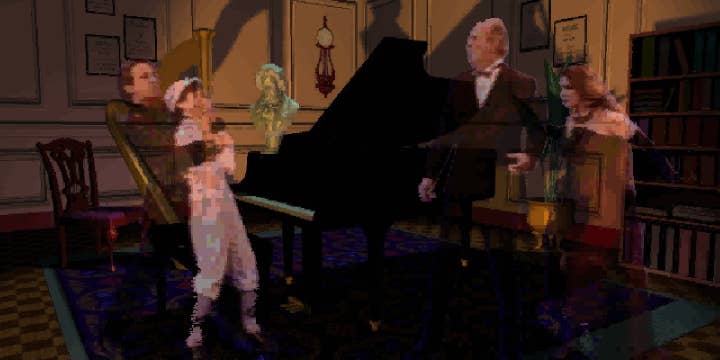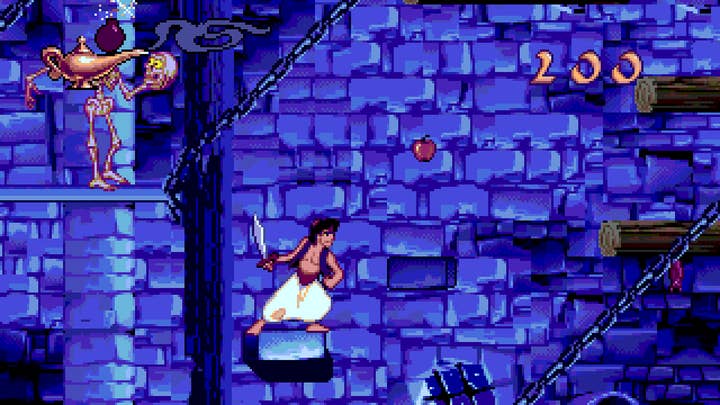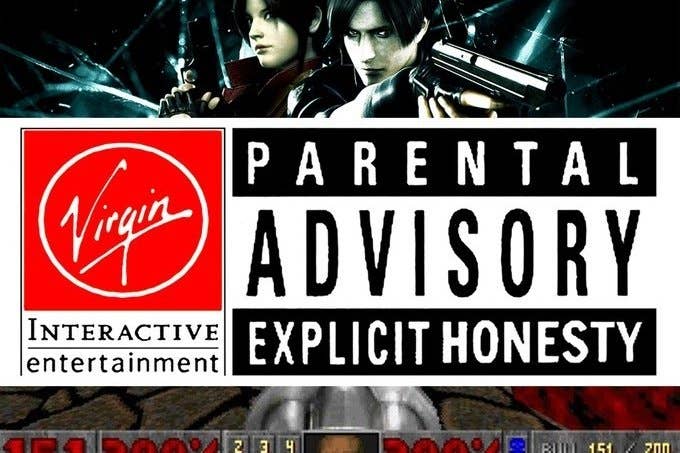"There were no rules...we made them up as we went along"
Sex & Drugs and Video Games: Tim Chaney's book on the industry of the '90s
What were you doing in the '90s? How sharp are your memories of 20 years ago? If you were working in certain sections of the games industry, either marvelling at the excesses of your colleagues or practicing a little indulgence yourself, then a forthcoming memoir from the ex managing director of Virgin Interactive, Tim Chaney, might jog a few of those hazy memories.
Chaney's book, Sex and Drugs and Video Games, promises to contain some interesting reminiscences. As the head of a major player in the final decade of the last century, with money to spare and bosses who had little interest in or knowledge of the industry he was helping to shape, Chaney was part of a world that was changing more rapidly than almost anybody could keep up with. To hear him tell it, he also had an unprecedented level of freedom in a world of vice, excess and irresponsibility.
But how much can really have been going on behind the closed doors of the company which brought you Command & Conquer, The 7th Guest and The Lion King? Were drugs really regularly posted out to reviewers along with review code? Were there hookers at every launch party? Did a PA really crash a Range Rover into the lobby of a hotel during a crucial meeting with a Japanese publisher, partially collapsing part of the building? According to Tim, at least one those is true...
"I think it's a time capsule. It's a time that will never come again. Nothing like it could ever come again, ever"
GamesIndustry.biz: This was all before my time, and it sounds like a very different industry to the one I've known for the last ten years. What was different then?
Tim Chaney: "Well I can only really see it from my perspective. Perhaps several perspectives, but mine for this purpose. We were a company that really didn't have any rules. We wanted to shock, we wanted to offend, we wanted to try things that nobody had done before. I think we had an attitude, or at least I did, of try anything, but if it doesn't work don't do it again. With that kind of attitude, and as you quite rightly said, without that boardroom influence, no approvals to do or say anything, you can go pretty bonkers.
"If you remember the '90s, it was things like Loaded, Britpop, Girl Power, all these things that empowered this sort of laddy, blokey, sex, drugs, party, fall over and sleep in the gutter attitude. As I said in my notes on the campaign, really the '90s was the permissive '60s. The '60s was mostly guys in bowler hats - 99 per cent. The people who wore flowers in their hair were insignificant compared to the movement of the '90s when people really let go after the miserable '70s and the Thatcher '80s. I'm pro-Thatcher, so I'm not saying anything horrible about that, but it was a period of time when England really changed.

"In terms of us, we had some great products and some terrible products, like every publisher had. You use the strong ones to pull the weak ones - use them for power with retailers and to attract other developers. The other thing we did was to go direct in France, direct in Germany, direct in Spain, before EA, before any of the other big publishers of the time - Ocean or US Gold - although I decimated that business by taking Woody and Bob and LucasArts, Access - we kind of took apart that business.
We were lucky insomuch that, at the beginning we were at Virgin, under Richard (Branson) and Robert Deveraux - they weren't going to say 'don't use an ad with this or that on it,' or 'don't say that word.' They didn't do that. Then we were sold to Blockbuster, who put us under Spelling Entertainment - Love Boat, Dynasty, all that lot. They didn't know what the hell we were doing, basically, so they couldn't tell us much. Then Viacom bought Blockbuster and got us and for at least a year didn't even notice us - they were busy trying to integrate Blockbuster into Paramount and other big things. So we had a few years, seven years, where we were doing whatever we wanted. Nobody in EA could do that, nobody in 99 per cent of American companies could do that at the time, unless you were an indie. We were like a massive indie."
GamesIndustry.biz: You were working under Branson then, who has been pretty open about his own excesses in the past. Did he keep his distance from what was happening?
"We were a company that really didn't have any rules. We wanted to shock, we wanted to offend, we wanted to try things that nobody had done before"
Tim Chaney: "In those days his principle interest was the airline. I met him a few times. You go to his house, you sit opposite him on a sofa, all very casual and informal as you'd expect. Women would be bringing documents in for him to sign, you'd be talking about the business and how it was going. But sometimes there'd be a lightbulb go off above his head - if you said something where he thought, 'I can use that on aeroplanes.' Like, playing games on planes. In '92, you didn't play games on planes. 'Games, games, games. Whatever. Oh, games on planes? Tell me about it!' It was that kind of meeting. I knew him personally, I went to his house in Kidlington, I played tennis with him. He was a decent guy. A typical entrepreneur insomuch that he had to hear a lot of pitches, he never made any notes. He'd just memorise all the bits that fitted into the wider scheme of things at the time.
"When I first went to see him, I remember saying to Robert Deveraux, who was his brother-in-law and my boss, 'What should I tell him? What's the spin? What do you want me to say?' And he said, 'Just tell him the truth, whatever it is, good or bad.' It was refreshing. If you were going to meet a chairman of a company now, someone would be prepping you for 24 hours on what to say and what not to say. Certainly, when we went to see Viacom, or they came to see us at E3, Sumner Redstone - who was the chairman, worth $25 billion or something - it just wasn't spontaneous, it was very planned. Going from Richard to Sumner, things changed a lot. At the time, Viacom had just written off $100 million on Viacom new media, the last thing they wanted was another games company. We spent a year schlepping around trying to sell ourselves to someone so they could make a load of money out of it. In the end, they didn't. That will all come to the fore when we get towards the end of the decade."
GamesIndustry.biz: It sounds like there's plenty to come out in the wash. Are you going to be protecting those involved?
Tim Chaney: It's a strange animal. Some people who were there have supported it, some haven't. It was 20 years ago, they've got kids now. I don't know if they want their kids to read this. Even then, though, I would change the names of anybody I was going to implicate in anything whatsoever. I can't just say some guy did this, snorted that, fucked that, then went home to his wife. I can't do that, it's not going to happen like that.

GamesIndustry.biz: And what about your own stories? You can't really anonymise yourself...
Tim Chaney: "It's all going to be me really. It's about the games, the games that made us great, but underneath that there's a massive layer of vignettes that people will think is fiction. 'There's no way this PA got out of her head, drove his Range Rover into the lobby of a hotel and collapsed it whilst I was upstairs meeting Capcom. That's just one story out of fifty. It's not a business book, in the same way Wolf of Wall Street wasn't. It's about the big games: 7th Guest, Resident Evil, Archer McLean's games, Lion King, Aladdin. It's about that, but underneath that, these sorts of things were happening - sometimes daily. I think it peaked around '95 when we just lost it completely. I think it'll be fun to write. I am going to change names, though. It'll be read by a lawyer before anyone. I don't want to offend my friends and acquaintances that were there, either. You either need to give them anonymity or make it dull as dishwater, and nobody wants to read that."
"Some people who were there have supported [the book], some haven't. It was 20 years ago. I don't know if they want their kids to read this"
GamesIndustry.biz: Some of these stories amount to open bribery of reviewers, are you concerned about adding any fuel to the fire of GamerGate? Of tarnishing anyone's reputations or that of the industry as a whole?
Tim Chaney: "It was 20 years ago. I can only talk about my own sensitivities and I'm pretty insensitive to it. It's a different world, a different life. Think about what's happened to you in the last 20 years. I don't think it's fuel on that fire, I think it's a time capsule. It's a time that will never come again. Nothing like it could ever come again, ever. It was a cottage industry in the early '80s, into a more stable business, more mature. We invented the games business back at US Gold and Ocean, really. There were no rules because we were making them up as we went along."
Tim Chaney's book is currently on Kickstarter. Find out more about it here

